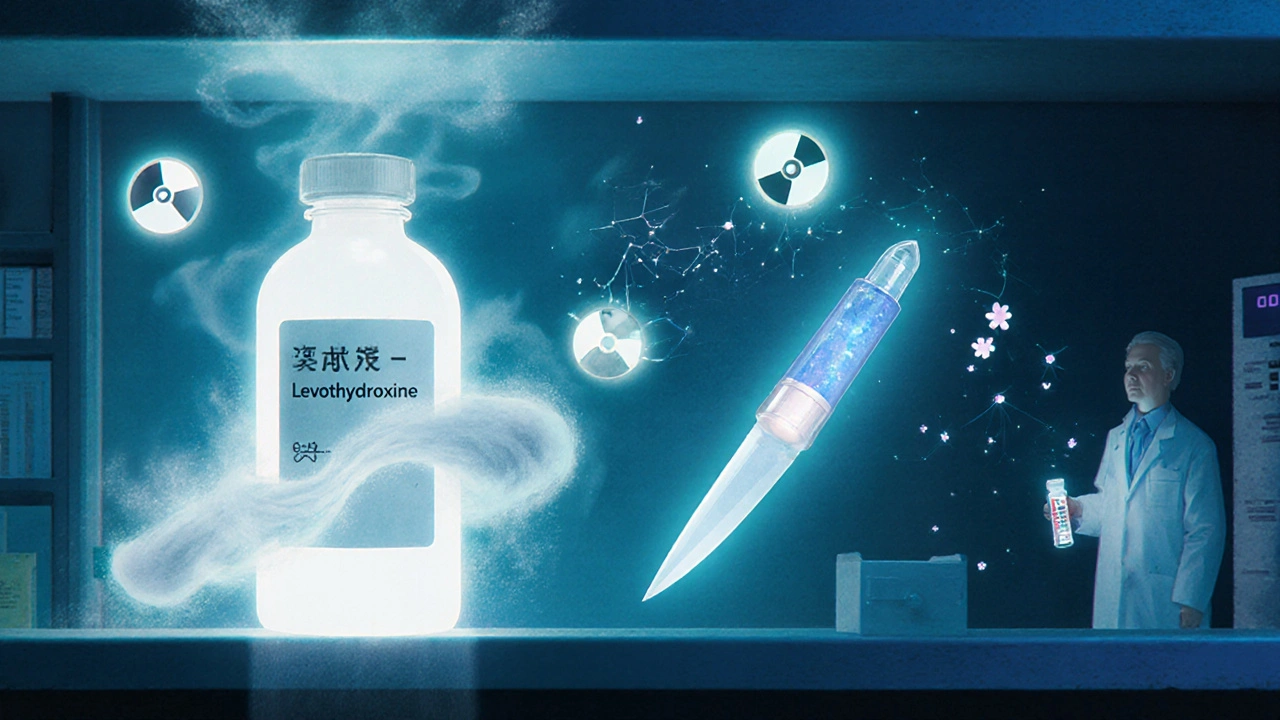Two out of every 100 Americans have a thyroid problem. Most don’t know it. Symptoms like fatigue, weight changes, or mood swings get blamed on stress, aging, or poor sleep. But sometimes, it’s your thyroid-hidden in your neck, whispering to your whole body. Hypothyroidism and hyperthyroidism aren’t just opposites; they’re two sides of the same broken switch. One slows everything down. The other speeds it up. And if you don’t know which one you’re dealing with, you could be treating the wrong problem.
What’s Happening in Your Neck?
Your thyroid is a small butterfly-shaped gland at the base of your throat. It makes two hormones: T4 and T3. These aren’t just for energy-they control your heart rate, body temperature, digestion, and even how fast your brain thinks. When the thyroid works right, it listens to your brain. The pituitary gland sends out TSH (thyroid-stimulating hormone) like a thermostat. Too cold? TSH says, ‘Make more heat.’ Too hot? TSH says, ‘Cool it down.’
Hypothyroidism means your thyroid isn’t making enough. It’s like your car’s engine is idling too low. Hyperthyroidism is the opposite-your thyroid is revving too high. One leaves you exhausted. The other leaves you wired. Both can sneak up slowly. Many people live for years thinking they’re just ‘getting older’ or ‘stressed out.’
Symptoms: Slowing Down vs. Speeding Up
If you have hypothyroidism, your body feels like it’s running on batteries that are almost dead. You’re tired even after a full night’s sleep. You gain weight-even if you’re eating the same as before. Your skin gets dry, your hair thins, and you’re always cold. Constipation becomes normal. Your periods get heavier. Depression creeps in. A 2023 survey found 87% of hypothyroid patients felt constant cold, and 78% had dry skin or brittle hair. Your heart rate drops below 60 beats per minute. You forget where you put your keys. Brain fog isn’t just a buzzword-it’s real.
Hyperthyroidism feels like your body’s stuck in overdrive. You lose weight even when you’re eating more. Your heart races-sometimes over 100 beats per minute-without exercise. You feel anxious, shaky, or panicked for no reason. Your hands tremble. You sweat nonstop, even in a cool room. Bowel movements become frequent, even diarrhea. Your periods get lighter or disappear. In 30% of cases, your eyes bulge or feel irritated-a sign of Graves’ disease. People with hyperthyroidism often say they feel like they’re on caffeine 24/7, but can’t sleep.
Here’s the twist: both can cause fatigue. About 70% of hypothyroid patients and 65% of hyperthyroid patients feel exhausted. That’s why doctors can’t just guess based on symptoms. You need a blood test.
What’s Causing It?
Most hypothyroidism cases-90% of them-are caused by Hashimoto’s thyroiditis. That’s an autoimmune disease. Your immune system attacks your own thyroid like it’s an invader. It’s like your body turns on itself. Surgery, radiation, or certain medications can also kill thyroid function.
Hyperthyroidism? About 70-80% of cases come from Graves’ disease-another autoimmune condition. But this time, your immune system sends signals that make your thyroid go into overdrive. Toxic nodules or multinodular goiters cause the rest. These are lumps in the thyroid that pump out extra hormones on their own.
Women are 5 to 8 times more likely to develop either condition. Why? It’s tied to immune system differences linked to X chromosomes. After 50, 1 in 10 women will have hypothyroidism. Men? Only 3%.

How Doctors Diagnose It
You don’t diagnose this by feeling your neck or guessing symptoms. The first and most important test is TSH. It’s simple, cheap ($25-$50), and accurate. In hypothyroidism, TSH is high-usually above 4.5 mIU/L-because your brain is screaming, ‘Make more thyroid!’ But your thyroid isn’t listening.
In hyperthyroidism, TSH is low-often below 0.4 mIU/L. Your brain says, ‘Stop making hormones!’ But your thyroid ignores it and keeps going.
Doctors then check free T4 and free T3 levels. Low T4 with high TSH = hypothyroidism. High T4 or T3 with low TSH = hyperthyroidism. In some cases, they test for antibodies to confirm Hashimoto’s or Graves’.
Here’s a hard truth: 60% of thyroid cases go undiagnosed. People blame their symptoms on something else. Even doctors sometimes miss it-especially in older adults. In people over 65, hyperthyroidism can look like dementia: no energy, no appetite, no interest. No racing heart. No anxiety. Just depression and confusion. That’s called apathetic thyrotoxicosis. It’s misdiagnosed 40% of the time.
Treatment: One Pill vs. Multiple Paths
Hypothyroidism treatment is simple: take a daily pill-levothyroxine. It’s synthetic T4. Your body converts it to T3. Dose? About 1.6 mcg per kilogram of body weight. So a 70kg person starts around 110 mcg. It takes 6 to 8 weeks to feel better. You’ll need blood tests every 6-8 weeks until your TSH is in the sweet spot: 0.5 to 2.5 mIU/L.
But here’s the catch: 15% of people don’t respond well. Why? Their bodies can’t convert T4 to T3 efficiently because of a genetic variation. Some feel fine on levothyroxine. Others still feel foggy, tired, or depressed-even with ‘normal’ labs. They might need a combo of T4 and T3, but most doctors won’t prescribe it unless you’ve tried everything else.
And timing matters. Levothyroxine must be taken on an empty stomach-30 to 60 minutes before breakfast. Coffee, calcium, iron, or even soy can block absorption. One study found 45% of patients skip this rule. They take it with their morning coffee. And wonder why they’re still tired.
Hyperthyroidism? No single fix. Three main options:
- Antithyroid meds: Methimazole or propylthiouracil. They block hormone production. Starts at 10-20 mg/day. You take it for 12-18 months. About 30-40% of people go into remission. But there’s a risk: liver damage or low white blood cells. Monthly blood tests are required.
- Radioactive iodine: You swallow a capsule. It destroys overactive thyroid cells. Works in weeks. But 80% of people become hypothyroid within a year. That means lifelong levothyroxine. It’s safe, effective, and common. Especially for people over 50 or those who don’t want long-term meds.
- Surgery: Removing part or all of the thyroid. Used if the gland is huge, if there are nodules, or if meds and iodine aren’t safe. Requires lifelong hormone replacement.
For pregnant women, propylthiouracil is preferred in the first trimester-but it carries a 1 in 5,000 risk of severe liver injury. Methimazole is safer later on. Untreated hyperthyroidism in pregnancy can cause preterm birth, low birth weight, or even miscarriage.

What Patients Really Say
Reddit’s r/Thyroid community has 125,000 members. One user wrote: ‘I take 100 mcg levothyroxine daily. My labs are perfect. But I still can’t remember my kid’s birthday. I feel broken.’ That’s not rare. 78% of hypothyroid patients report brain fog even with normal TSH.
On ThyroidChange.org, a Graves’ patient said: ‘My heart hit 140 bpm while sitting. I thought I was having a heart attack. It was my thyroid going crazy.’ That’s hyperthyroidism. Panic attacks, shaking, racing heart-these aren’t just anxiety. They’re physical.
And the treatment side effects? 68% of people who get radioactive iodine for hyperthyroidism end up needing levothyroxine within a year. They didn’t expect to trade one thyroid problem for another.
Cost, Impact, and the Future
Thyroid meds are big business. Levothyroxine is the third most prescribed drug in the U.S.-114 million prescriptions in 2022. Hypothyroidism costs $1,200-$2,500 per year in lost work time. Hyperthyroidism? $3,500-$6,000 because of testing, meds, and procedures.
Future treatments are coming. New drugs like Resmetirom are in trials for thyroid hormone resistance. Genetic tests might soon tell you if your body struggles to convert T4 to T3. That could change how we treat the 15% who don’t respond to standard pills.
For now, the best advice is simple: If you feel off-tired, cold, gaining weight, or anxious, racing, losing weight-ask for a TSH test. Don’t wait. Don’t assume it’s stress. Thyroid disorders are common, treatable, and often invisible. Get tested. You might just find out what’s been slowing you down-or speeding you up-without you even realizing it.

